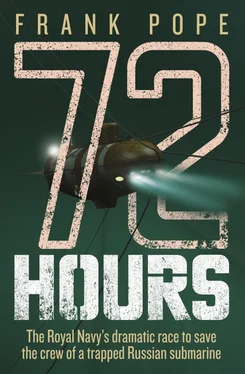Riches almost gagged at the aggressive stench of excrement. The room was bare except for a stack of torn pieces of news paper hanging on a string and there was a hole in the deck through which he could make out a ragged circle of sea. The Russians were using the 18th-century version of the ship’s lavatory, and were missing their target regularly. They’d better get this rescue done quickly, he thought.
The crane driver revved his engine to get more power and a black plume of diesel smoke drifted across the floodlights. He swung the arm over to the waiting trucks with impressive speed, and soon the hook was flying down towards Scorpio’s control container. Just before impact there was a loud metallic clunk from the crane’s gearbox, and the hook jarred to a halt.
Steel wires were fixed to the corners of the container and slipped over the hook, and the crane started to lift. Everything was holding. But when the crane’s arm swung back towards the ship it did so at the same high speed. Alarmed, Riches asked Captain Holloway to remind them that the rescue equipment was fragile and had to be treated gently. The answer came back that the operator would do his best to be gentle, but that the crane had only two speeds. Watching its progress, he could now see this was true: uncontrollably fast, or stopped.
The disintegrating infrastructure in Russian ports was notorious. The cranes in the Naval dockyards had all been built in Odessa when the Ukraine was still joined to Russia as part of the Soviet Union. The last maintenance contracts were awarded in 1998, but since then there had been none. As a result, only three of the 14 100-ton cranes operated by the Russian Federation Navy still worked, and of the 63 40-ton cranes, only 17 were operational. In 1999, the Commander-in-Chief, Admiral Vladimir Kuroyedov, had formally requested new funding, declaring that Naval ships couldn’t offload their weapons for critical inspections because the cranes were a safety hazard. Kuroyedov eventually won a $17m contract for new cranes and essential maintenance but, despite the Deputy Prime Minister saying he would personally supervise the budget, in early 2000 the funds were diverted into building a new submarine instead.
Only months later the Kursk exploded, and investigations revealed that the huge and temperamental Shkval ‘Fat Girl’ torpedo that caused the initial blast had landed hard on the dockside during loading nine days before the accident. The jerky movements of the long-neglected crane had caused the chains and strops that were holding the missile to slip and, in order not to lose it completely, the driver had been forced to get it to the ground, fast.
Two months before that, in June 2000, a crane accident in the Pacific Fleet had caused a missile to release some of its toxic fuel, killing one sailor and injuring another 11. Loading live weapons with decrepit equipment was so dangerous that once shipped on to the submarines that carried them, they were often not offloaded either for maintenance or for exercises. If they had been, the devastating secondary explosion that ripped through the Kursk would not have happened.
Scorpio’s control centre – housed within its converted 20-foot shipping container – was landed safety thanks to a skilful piece of braking by the crane operator just before it hit the deck. Nuttall, his long hair matted on his back from the rain, didn’t look concerned. He said he’d seen plenty of dockyards whose cranes were a bit rough and ready. They were designed for loading and unloading bulk cargoes, he reasoned, but the operators were usually used to their quirks and got pretty good at their job.
Scorpio itself was next. The crane driver had been told several times how fragile the equipment was, so all they could now do was hope. Tense concern reappeared on Gold’s face as his precious machine was jerked off the flatbed truck and swung over the midships section of KIL-27 . Scorpio hung there for a second, then the crane driver let the cable spool out. It was hell-raisingly fast, apparently uncontrollable. The driver stopped its fall halfway with a jerk, and allowed Scorpio to settle again before releasing it once more. Twice more the cautious driver stopped it, getting the robot to within a metre or so of the deck before trying one last spool-out. Scorpio crashed to the deck, even bouncing slightly before settling. Nothing fell off, but it was as hard an impact as he’d ever seen it take.
Saturday, 6 August/Sunday, 7 August
SS + 57 h 30 mins
14.00 UK – 17.00 Moscow – 02.00 Kamchatka
Petropavlosk-Kamchatsky
Back in a bleak, grey apartment block in Petropavlosk, Yelena Milachevskaya lay in her sister’s bed looking at the phone. She was still unable to eat. At least Artyom was looking after the girls, taking them out for walks and giving them food. What would she have done without him? Following Guzel Latypova’s lead, other journalists had filmed interviews with her, and now her sobbing face had become a staple on the news reports about the ongoing drama.
Marina Belozerov, wife of Warrant Officer Sergei Belozerov, whose café was doing such brisk business on the stricken submersible, could not bear to remain inactive any longer. She had hardly slept at all since first hearing about the accident almost 60 hours ago, and had not let her phone out of her hand in case she missed some news. When she heard that the British rescuers were about to head out on a ship, she gathered up her daughter and made her way to the Naval headquarters. She had to get on board and get closer to her Sergei. If he died, she wanted to be as near as possible. If he escaped, she wanted to be the first to see his smiling face.
They were turned away at headquarters. There was no room on board, they were told, and their presence might hamper the efforts to rescue the men. Reluctantly, Marina led her daughter away and back into the night.
Tatiana Lepetyukha was not so easily deterred, as befits the wife of the captain. The quiet, insistent voice inside her head that had guided her since her father’s death had returned at the church service she’d organised the previous day. It told her that all was not lost, and that a bad ending was not yet a certainty. Deep within herself she had a growing feeling that all was going to end well. The voices – for there were now several of them – didn’t end there. They told her that she had to be on the rescue vessel, as close as possible to her husband.
Leaving her 13-year-old son at home to look after the dog, she made her way to the Naval headquarters. First the guards, then the officers tried to assure her that things would be smoother and easier without her there, but she didn’t listen. She would not take no for an answer. It was an impulsive decision, but was no less firm because of it. A part of her was watching her insistence as if from outside, cringing at the thought she was making so much trouble for Valery’s beloved Navy at a time like this. But the inner voices won, and she persevered.
Eventually, the Master decided to let her come on board. When a woman is in such a state of mind, he thought, it would be very difficult to stop her. KIL-27 was a civilian ship after all, and there was already a woman on board, working in the galley. He weighed up the danger of her breaking down in hysteria or with a panic attack and decided to bring a doctor along from the hospital just in case. She was ushered on board quietly, without informing the British rescuers, and told that under no circumstances must she interfere.
Saturday, 6 August/Sunday, 7 August
SS + 57 h 50 mins
14.20 UK – 17.20 Moscow – 02.20 Kamchatka
Petropavlovsk docks
It was almost half past two in the morning before the UK team had a chance to sit down with Dmitriy Podkapayev and get a full briefing on what awaited them beneath the surface. While the rest of the crew continued to shift, unpack and prepare equipment, Stuart Gold, Captain Holloway and Comander Riches followed Podkapayev’s white-blond head down a peeling passageway and into the officers’ mess.
Читать дальше












